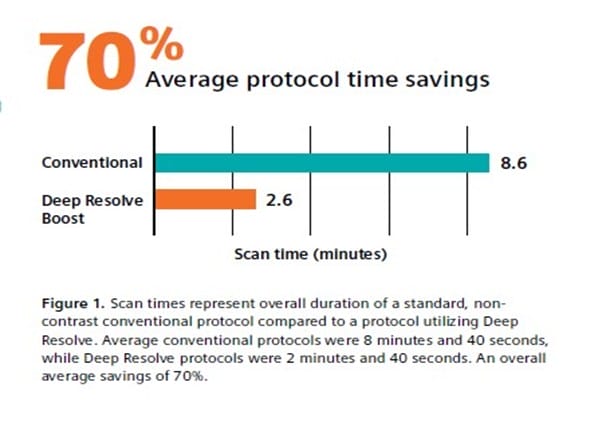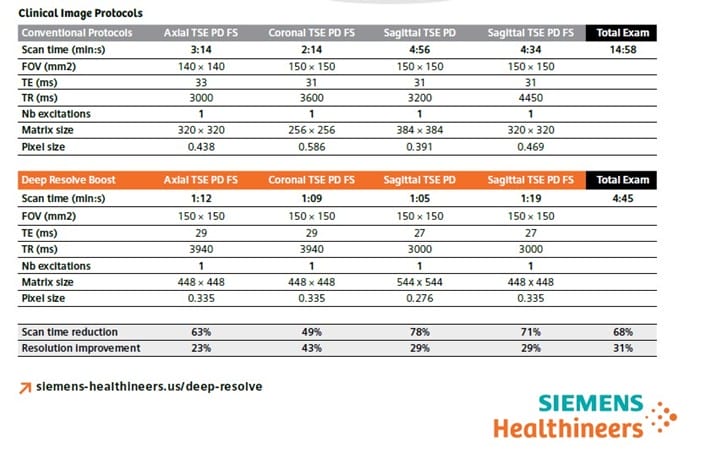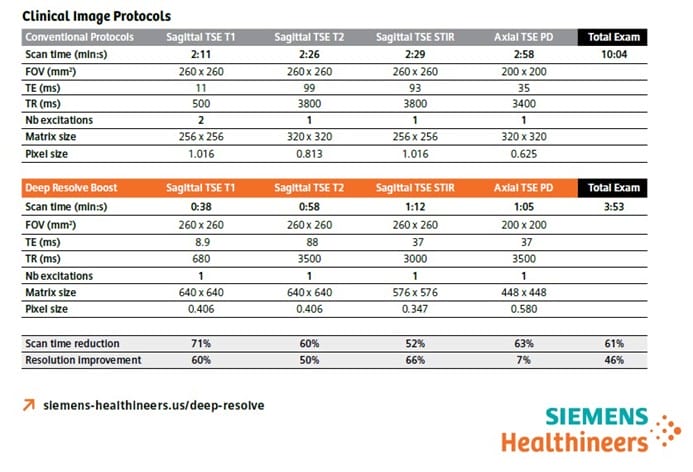Siemens Healthineers has firmly established itself as a leader in the AI technology space with the introduction of its innovative Deep Resolve AI. This achievement has given Siemens a significant edge over other OEMs, thanks to their dedicated efforts in becoming a frontrunner in the field, and the impressive results speak for themselves.
How does AI technology affect the Healthcare Industry?
AI in MRI is having a significant impact on healthcare providers by transforming various aspects of patient care, clinical efficiency, and operational workflows. Here are a few keyways AI is influencing healthcare providers:
Improved Diagnostic Accuracy
AI algorithms can analyze MRI images with a high degree of precision, helping healthcare providers identify subtle abnormalities that might be missed by the human eye. This leads to more accurate diagnoses and better treatment plans, ultimately improving patient outcomes.
Enhanced Image Quality
AI can improve image resolution and signal-to-noise ratios, leading to clearer and more detailed images. This helps radiologists make more informed decisions, increasing the reliability of diagnoses and reducing the likelihood of errors.
Increased Productivity and Efficiency
AI-powered MRI systems automate many aspects of the imaging process, such as image reconstruction and analysis. This frees radiologists and technologists to focus on other tasks, leading to greater productivity and efficiency in the department. It also allows more patients to be seen within the same timeframe. This efficiency leads to shorter scan times, reduces the need for repeat scans, and improves communication with healthcare providers, all lead to higher patient satisfaction.
Reduced Human Error
AI systems are designed to minimize human error by assisting healthcare providers with precise image analysis and decision-making. This can reduce misdiagnoses, unnecessary repeat scans, and the time spent reviewing images, improving both the accuracy and efficiency of the imaging process.
Cost Efficiency
By reducing scan times, minimizing the need for follow-up scans, and improving diagnostic accuracy, AI helps reduce costs for healthcare providers. Additionally, optimized workflows and increased productivity allow providers to serve more patients without significantly increasing operational costs.
Better Decision-Making for Healthcare Providers
AI-powered insights help clinicians make better-informed decisions based on comprehensive image data. This is particularly helpful in complex cases where precision is crucial, such as detecting tumors, neurological conditions, or musculoskeletal disorders.
In summary, AI in MRI is revolutionizing healthcare by improving diagnostic accuracy, enhancing patient care, optimizing workflows, and reducing costs. These advancements empower healthcare providers to deliver more effective and efficient care, benefiting both patients and medical professionals alike.
AI Technology in Mobile MRI’s:
When it comes to AI in mobile devices, there’s been remarkable progress. While MRI remains the gold standard in medical imaging, it comes with its own set of challenges, including long scan times, motion intolerance, and the need for a careful balance of signal-to-noise ratio (SNR). However, with the integration of MRI and Deep Resolve AI, Mobile MRI imaging is now poised to overcome these obstacles. This breakthrough is set to revolutionize our understanding of image resolution and scanning speed.
Graph courtesy of Zwanger-Perisi Radiology.
Let’s further explore the advantages of AI. The graph below shows the results of a patient’s knee scan. When using the conventional knee protocol, the scan time was significantly longer. In contrast, the Deep Resolve-based knee protocol reduced the scan time by 68% while increasing image resolution by an average of 31%.
The new Deep Resolve-based knee exam takes just 4 minutes and 45 seconds, making it easy to fit into a 15-minute scheduled exam slot. This time includes patient positioning, the scan itself, and patient exit from the MR scanner.
By combining faster scan times with enhanced image quality, the Deep Resolve Protocol not only boosts patient satisfaction but also provides radiologists with better-quality images for more accurate diagnoses.
Accelerated image acquisition of lumbar exam with Deep Resolve Boost Patient underwent a lumbar examination of a Siemens (1.5T MAGNETOM Altea) MRI. Compared to the conventional lumbar protocol, the Deep Resolve-based lumbar protocol drove a total reduction in scan time of 61% with an
average resolution increase of 46%. The new Deep Resolve-based lumbar exam time (3:53 min) provides a high-resolution examination in both sagittal and axial planes under 5 minutes. The combination of Deep Resolve accelerated scanning and improved image resolution provides a much higher level of patient satisfaction as well as improved clinical study for the radiologist to make the proper diagnosis.
Graph courtesy of Zwanger-Perisi Radiology.




